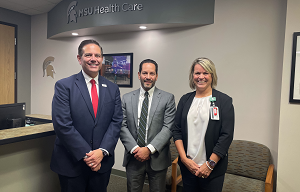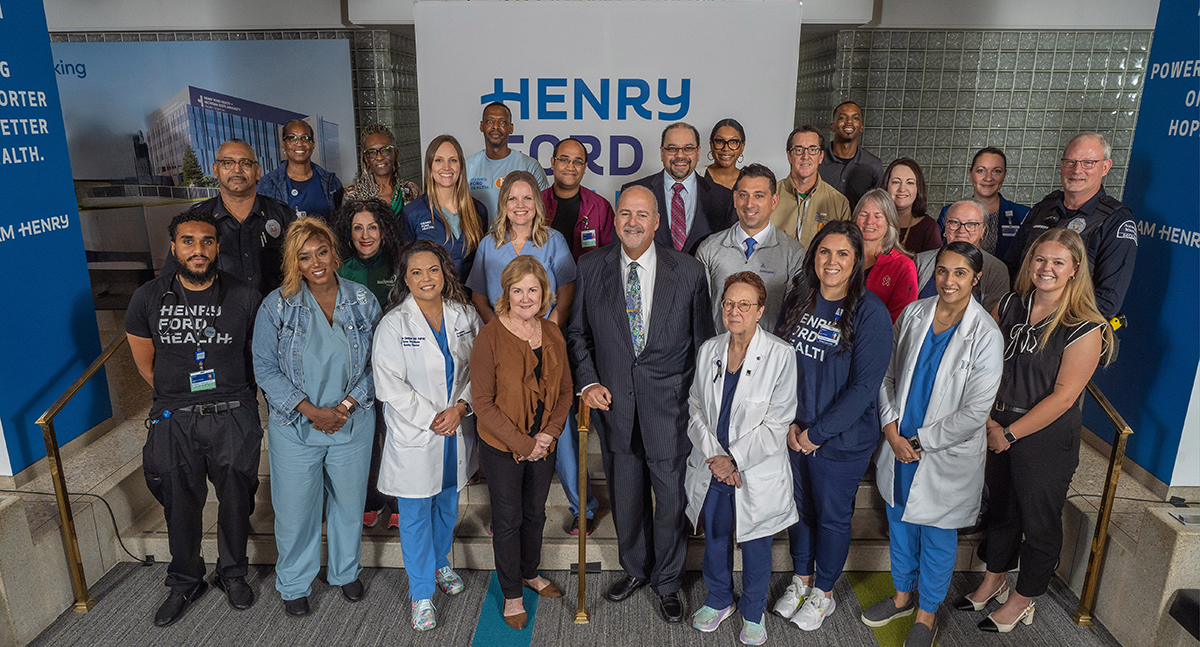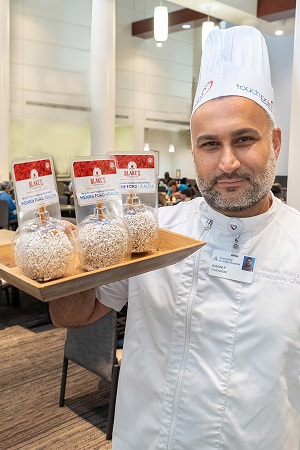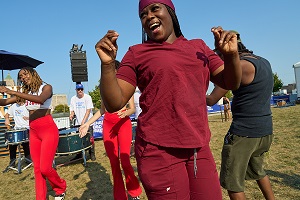
Ankle Injuries
At some point in their career, almost every athlete rolls an ankle, but even the most common sports injuries require special care and attention. That’s why, at Henry Ford, our team of board-certified sports medicine physicians and orthopedic surgeons routinely provide reliable, individualized treatment for all forms of ankle injuries ranging from simple sprains to complex fractures. So no matter how unique your injury is, we’re here to treat it with the most effective and innovative options available.
Common ankle injuries
-
Ankle sprain
Ankle sprains occur when one of the ligaments in the ankle is damaged or strained, often as a result of rolling or twisting the joint. Sprains are classified by grade (1, 2 or 3) depending on severity. In a grade 1 sprain, little to no tearing occurs. A grade 2 sprain involves a partial tear to the ligament, while a grade 3 sprain is a complete tear of the ligament.
Symptoms
- Pain
- Swelling
- Tenderness
- Bruising
Average recovery time
A few days to a few weeks, depending on the grade of the sprain.
-
Ankle fracture
The ankle joint is comprised of three bones the tibia, fibula and talus. An ankle fracture involves a break to at least one of these bones. Fractures most often occur as a result of a high-force impact or from an awkward twist or rotation. Some ankle fractures can feel similar to an ankle sprain, so it’s important to have a physician evaluate your injury properly.
Symptoms
- Severe pain
- Swelling
- Bruising
- Obvious deformity
Average recovery time
Varies depending on severity.
-
Achilles tendon rupture
Your Achilles tendon, located at the back of your ankle, is the largest tendon in the body and connects the calf muscle to the heel bone. When this tendon breaks or tears, it can be severely painful. Ruptures are common in sports that involve running, jumping and pivoting, especially for athletes over the age of 30. Surgery is the most common form of treatment for an Achilles tendon rupture, but it’s not always necessary.
Symptoms
- Severe pain
- A snapping sound at the time of injury
- Inability to walk or raise the foot
Average recovery time
Six weeks to six months, depending on severity.
When to see a doctor
Minor ankle injuries can often be treated at home with rest, ice, compression and elevation, but if ankle pain has persisted for more than a few days, or if it’s preventing you from walking, running or participating in your sport, consult a doctor.
See a doctor immediately if your ankle pain was caused by a particularly forceful impact or if it's accompanied by:
- Swelling
- Bruising
- Tenderness
- Limited flexibility in the ankle
- Inability to stand or walk
- An audible “pop” at the time of the injury
How we treat ankle injuries
Ankle treatment at Henry Ford typically begins with a physical exam with one of our primary care sports medicine physicians. After a diagnosis has been made, sometimes with the help of an X-Ray, MRI or CT scan, we’ll develop a treatment plan tailored to you and your injury. If surgery or other steps are necessary, our staff will refer you to the proper team member, whether it’s an orthopedic surgeon, podiatrist, athletic trainer or physical therapist.
Treatment options
-
Non-Surgical Treatment
-
Surgical Treatments
R.I.C.E. method (Rest, Ice, Compression, and Elevation) — When an ankle injury first occurs, patients should rest the affected area to prevent further injury from occurring; ice it to reduce pain and compress it to reduce swelling.
Physical Therapy — Many ankle injuries can be treated with physical therapy, either on its own or in conjunction with surgery. For recovering patients, Henry Ford’s dedicated rehabilitation team takes a multidisciplinary approach, combining exercise and strength training with manual therapy at more than 20 outpatient facilities across southeast and south central Michigan. Special therapy, such as aquatic therapy, may also be used.
Anti-inflammatory medication — Over-the-counter drugs such as Tylenol, Advil, Motrin, and Aleve can often help reduce ankle pain from minor sprains and aid in initial recovery.
Ankle Arthroscopy — This minimally invasive procedure allows surgeons to use a small camera to treat and diagnose a variety of ankle injuries including ankle fractures, arthritis, instability and other issues.
Ligament Reconstruction — Often used when an ankle ligament has been torn completely, ligament reconstruction surgery can also be a particularly effective treatment for those who suffer from chronic ankle sprains.
Tendon Repair — Occasionally, surgery may be required to repair a torn tendon. Some tendon tears can be healed with physical therapy or immobilization, while others may require surgery to sew the torn ends of the tendon together and improve mobility.
Ultrasound guided, minimally invasive procedure – Tenex is used to treat tendonitis and chronic pain in soft and hard tissue, using ultrasonic energy. It’s a precise option to remove only the damaged tendon tissue causing the pain. Performed using local anesthesia, a 3mm microincision and no stitches required.


‘An Incredible Privilege’: Henry Ford Health & Ascension Michigan Launch New Organization
The joint venture will expand the Henry Ford Health brand to include Ascension’s southeast Michigan and Genesys healthcare facilities and assets

'A Sweet Beginning': The Story Behind the Caramel Apples on Day 1

Community Members Join Henry Ford Hospital Team for Day-Long Celebration to Mark Historic Detroit Groundbreaking

Common Causes Of Constipation—And How To Find Relief
Here's what really counts as constipation, plus common causes, fast at-home treatments, and tips to stay regular and prevent future backups.

Why You Should Eat More Resistant Starch
Resistant starch may help control blood sugar, lower your risk of heart disease and keep your gut healthy.

Do Nasal Strips Improve Athletic Performance?
Hard evidence of their effectiveness may be lacking, but many swear by wearing nasal strips during workouts and competitions.

The Importance of Clinical Trials To Advance Science
Advances in medicine would not be possible if people didn't enroll in clinical trials. Here's how they work and how to get matched with one.
.svg?iar=0&hash=F6049510E33E4E6D8196C26CCC0A64A4)

/hfh-logo-main--white.svg?iar=0&hash=ED491CBFADFB7670FAE94559C98D7798)
